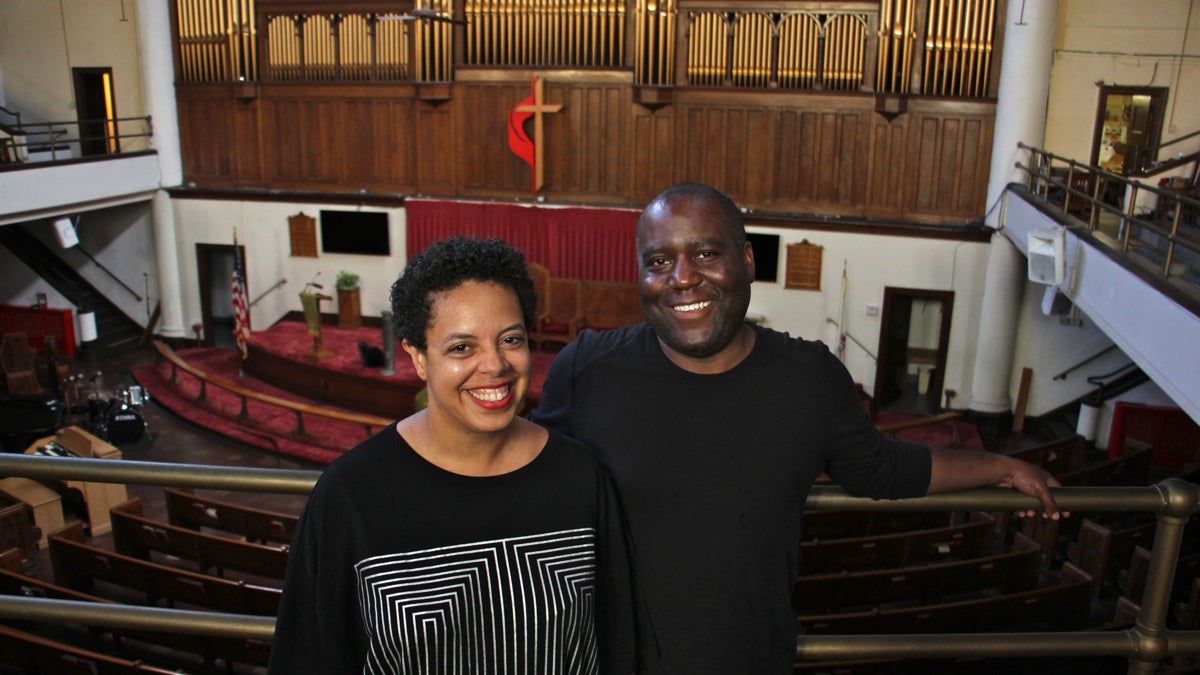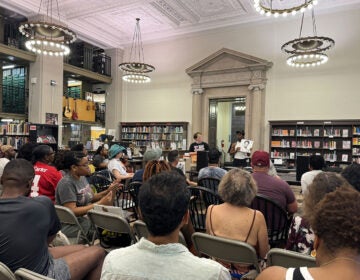Once again, Tindley Temple will make a joyful noise

Menti and Keith Obadike created a sound installation for Tindley Temple that will play from the rooftop each day at the rising of the sun. (Emma Lee/WHYY)
Until the system broke down about 10 years ago, Tindley Temple, on Broad Street just below South, used to sound bells every Sunday morning.
It now has new speakers. Instead of bells, they emanate a melodic drone with a hint of human voice and occasional chime. Every morning, precisely at sunrise, the Graduate Hospital neighborhood will hear 15 minutes of the sound.
It’s an abstraction of “We’ll Understand It Better By and By,” a gospel tune written by Charles Tindley in 1905. The founding minister of this 110-year-old Methodist church, which would become named after him, Tindley wrote gospel songs on the side.
“It’s a well-known song,” said sound artist Keith Obadike. “A lot of people have recorded this song — gospel people, pop people … Elvis recorded a version of this song.”
Obadike and his wife and artistic partner, Mendi, performed a single phrase of the song, at an extremely slow tempo, stretching it out to 15 minutes.
They were commissioned to make this sound installation by the Scribe Video Center in West Philadelphia, to mark the centenary of the “Great Migration.” One-hundred years ago, vast numbers of African-Americans migrated from the South to the North to find jobs. The move changed the U.S. economy and its cities.
Tindley Temple played a big part in the migration; newcomers to Philadelphia would flock to the church because they knew of Tindley’s reputation, and that he would take care of them.
The church seats 3,200, and Tindley would pack it every Sunday for three services. At its height, it had 10,000 congregants, the largest African-American church in the country.
“We’ll Understand It By and By” is, on the surface, a spiritual message of hope — that awaits in heaven.
When the saints of God are gathered home, we’ll tell the story how we’ve overcome, for we’ll understand it better by and by.
He may also have intended to convey a political message in the song.
“On the one hand, there is a idea that everything will be better in the afterlife,” said Mendi Obadike. “But Tindley worked a lot to make people’s lives better. He had a program to feed the hungry. A lot of churches weren’t doing that.
“He was involved in getting the church to speak out against injustices,” she said. “He was working to bring about that hopeful situation before people died.”
The volume of the outside speakers is adjusted to be what church bells would be — just above the level of traffic noise. The sound will last for 15 minutes a day, for two weeks, and then the installation will be removed. The church gets to keep the new speakers.
WHYY is your source for fact-based, in-depth journalism and information. As a nonprofit organization, we rely on financial support from readers like you. Please give today.





